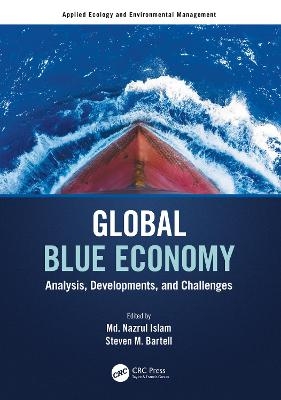
Global Blue Economy
CRC Press (Verlag)
978-1-032-01272-8 (ISBN)
A global blue economy is an economic arena that depends on the benefits and values realized from the coastal and marine environments. This book explains the "sustainable blue economy" as a marine-based economy that provides social and economic benefits for current and future generations. It restores, protects, and maintains the diversity, productivity, and resilience of marine ecosystems, and is based on clean technologies, renewable energy, and circular material flows.
Dr. Md. Nazrul Islam is a professor in the Department of Geography and Environment, Jahangirnagar University, Savar, Dhaka, Bangladesh. He earned his PhD from the Graduate School of Engineering, University of Tokyo, Japan. He completed a two-year standard JSPS postdoctoral research fellowship with the Marine Ecosystems Engineering Laboratory at the University of Tokyo, Japan. Dr. Nazrul Islam has visited as a researcher and been invited as a speaker at several universities of Japan, the US, Australia, the UK, Canada, China, South Korea, Germany, France, the Netherlands, Taiwan , Vietnam, and many more. He received the Best Young Researcher Award from the International Society of Ecological Modeling (ISEM) for outstanding contribution to the ecological modeling fields, and the Best Paper Presenter Award by SautaiN in Kyoto, Japan in 2010. Dr. Nazrul Islam has been honored with the Young Scientist Financial Award by the Committee of International IOC/WESTPAC Science, Busan, South Korea. Dr. Nazrul Islam has authored more than 100 peer-reviewed articles and authored 15 books and research volumes. He has published with CRC Press (Taylor & Francis) the handbook, Environmental Management of Marine Ecosystems, jointly with the late Professor Sven Erik Jorgensen. Presently, he is the executive editor-in-chief of the journal, Modeling Earth Systems and Environment, from Springer International Publications. Dr. Steven Bartell is the technical director and senior principal of ecological and environmental modeling at Cardno, Tennessee, US. He is a broadly trained quantitative systems ecologist and environmental scientist with keen interests in the efficient and effective transfer of advances in basic research and development to practical applications in support of environmental assessments. Dr. Bartell offers extensive technical skills and experience in ecosystem analysis and ecological modeling. He demonstrates modeling capabilities that include individual-oriented models, demographic population models, bioenergetics-based models of populations, communities, and ecosystems, and spatially explicit watershed models. He is the originator of the Comprehensive Aquatic System Model (CASM). Dr. Bartell has applied these skills and models in assessing ecological risks posed by a variety of physical, chemical, and biological environmental stressors. He has also used his modeling skills to project the likely outcomes of large-scale ecosystem management and restoration actions. Dr. Bartell is the editor-in-chief of the CRC Press/Taylor & Francis Book Series, "Applied Ecology and Environmental Management" and has contributed to many publications.
Chapter 1. Concepts, Tools and Pillars of the Blue Economy: A Synthesis and Critical Review, Chapter 2. Realising Blue Economy Potential in Malaysia, Opportunities and Challenges, Chapter 3. Optimising the connectivity of salmon farms: role of exposure to wind, tides and isolation,Chapter 4. Offshore Fish Farming: Challenges and Developments in Fish Pen Designs, Chapter 5. Risk Finance for Natural Disaster in Lakes and Coastal Seas through Modeling Techniques, Chapter 6. Blue economy prospect, opportunities, challenges, risks, and sustainable development pathways in Bangladesh, Chapter 7. Application of Blue Economy for Polymetallic Nodules from the Central Indian Ocean Basin, Chapter 8. Development and Challenges of Indian Ocean Blue Economy and Opportunities for Sri Lanka, Chapter 9. Marine Ecosystem Services: SDGs Targets, Achievement and Linkages with the Blue Economy Perceptions, Chapter 10.Blue Economy Paradigm and Seafloor Massive Sulphides along the Indian Ocean Ridge Systems, Chapter 11. Global Scenarios of Seaweed Cultivation: Science-Policy Nexus for Enhancing the Seaweeds and Algae Farming, Chapter 12. Deep-Sea Mining and Potential Risk: Opportunities and Challenges, Chapter 13. Modern Seafood Production to Enhance the Blue Economy: A Proposed Sustainable Model for Bangladesh, Chapter 14. New Challenges for Sustainable Plastic Recycling in Japan, Chapter 15. Marine Pollution and Ecosystem Health: Challenges for Developing Sustainable Blue Economy, Chapter 16. Seaweed Farming Potential in India: An Assessment and Review, Chapter 17. Modeling of Marine Policy Regime Creation for Enhancing Blue Economy in Global to Regional Aspects
| Erscheinungsdatum | 09.11.2022 |
|---|---|
| Reihe/Serie | Applied Ecology and Environmental Management |
| Zusatzinfo | 60 Tables, black and white; 44 Line drawings, color; 43 Line drawings, black and white; 91 Halftones, color; 13 Halftones, black and white; 135 Illustrations, color; 56 Illustrations, black and white |
| Verlagsort | London |
| Sprache | englisch |
| Maße | 178 x 254 mm |
| Gewicht | 1380 g |
| Themenwelt | Naturwissenschaften ► Biologie ► Ökologie / Naturschutz |
| Naturwissenschaften ► Geowissenschaften ► Geografie / Kartografie | |
| Technik ► Umwelttechnik / Biotechnologie | |
| Wirtschaft ► Volkswirtschaftslehre | |
| Weitere Fachgebiete ► Land- / Forstwirtschaft / Fischerei | |
| ISBN-10 | 1-032-01272-2 / 1032012722 |
| ISBN-13 | 978-1-032-01272-8 / 9781032012728 |
| Zustand | Neuware |
| Informationen gemäß Produktsicherheitsverordnung (GPSR) | |
| Haben Sie eine Frage zum Produkt? |
aus dem Bereich


